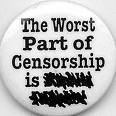“Fully democratic open-source networks inevitably get corrupted by loonies.” That according to Andrew  Keen in his controversial book on Web 2.0 The Cult of the Amateur. The subtitle of the book is, “How blogs, MySpace, YouTube, and the rest of today’s user-generated media are destroying our economy, our culture, and our values,” which gives you an idea of why the book is controversial. But as infuriating as Keen’s thesis — and his solution — is, it appears his conclusions cannot be escaped.
Keen in his controversial book on Web 2.0 The Cult of the Amateur. The subtitle of the book is, “How blogs, MySpace, YouTube, and the rest of today’s user-generated media are destroying our economy, our culture, and our values,” which gives you an idea of why the book is controversial. But as infuriating as Keen’s thesis — and his solution — is, it appears his conclusions cannot be escaped.
Enter YouTube, pinnacle of the open-source network. From the Irish Times:
IN RECENT months, long-time users of video-sharing website YouTube have noticed that the Google-owned site’s definition of acceptable content has narrowed considerably.
In addition to its longstanding campaign to crack down on illegally copied material, in September the site outlawed videos depicting drug abuse and last week tightened its guidelines further to restrict profanity and sexually suggestive content.
In other words, before the money wagons roll in, some law and order needs to be imposed.
Law and order, indeed! But whenever you talk about imposing “law and order,” cries of censorship follow. Trouble is, YouTube has always placed restrictions on what they regard as “acceptable content.” It’s not only their prerogative, it’s their obligation. Thus, Keen asks the obvious, and steers us toward the inevitable answer:
Can we really trust society to behave properly in the Wild West culture of the Web 2.0 revolution?
I would agree that we are easily seduced, corrupted, and led astray. In other words, we need rules and regulations to help control our behavior online, just as we need traffic laws to regulate how we drive in order to protect everyone from accidents. Sometimes it takes government regulation to protect us from our worst instincts and most destructive self-behavior. the fact is, modest regulation of the Internet works. (pg. 196, emphasis mine)
Of course, the suggestion that sometimes it takes “government regulation to protect us from our worst instincts and most destructive self-behavior” will cause many to bristle. But unless they are advocating anarchy, even the most fierce freedom-of-speech proponents would agree that some government regulation is necessary. So as with most of these censorship debates, the real issue is not IF a line should be drawn, but WHERE.
While “acceptable content” is different for everyone, the fact is some content IS unacceptable. As I see it, the opponents of YouTube’s actions cannot dispute that some content is unacceptable. They can, however, dispute WHAT content is unacceptable. But as long as YouTube patrols, er, hosts, that network, it’s up to them to decide. It just so happens that, in this case, narrowing the definition of acceptable content seems both inevitable and the responsible thing to do.














